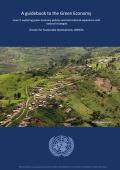In 2005, the concept of green growth was introduced in the Asia-Pacific region as a strategy for sustainable growth in developing countries. This roadmap, produced by the United Nations Economic and Social Commission for Asia and the Pacific (UNESCAP), is intended for the use of member states to help policymakers find win-win strategies for promoting growth and reducing carbon emissions. Drawing upon innovative approaches, particularly from the Republic of Korea, this manual lays out the challenges, strategies and policy options of green growth in several critical sectors.
The document is divided into two parts, with additional case studies and fact sheets available via CD-ROM. Part one presents an overview of the opportunities and challenges the region faces regarding low carbon green growth. It also discusses the system change required to shift focus to this new development path. Part two of the roadmap shows how to start the process of pursuing green growth through five different tracks, outlined below, which are seen as core elements of necessary systemic change:
This volume discusses several policy challenges facing countries to achieve and sustain inclusive growth. It is based on the proceedings of a conference co-organised by the OECD Economics Department and the World Bank on 24-25 March 2011, which brought together academics and practitioners from advanced, emerging-market and developing economies. While discussions on strong growth typically focus on the pace of economic expansion, those on inclusiveness also delve into the patterns of growth and on how its benefits are shared among the various social groups. An important message that came out of the conference is that strong growth is not necessarily inclusive and that policy action is needed to make sure that pro-growth initiatives also foster inclusiveness.
The concept of green economy has received significant international attention over the past few years both as a tool to address the 2008 financial crisis as well as one of the two themes for the 2012 United Nations Conference on Sustainable Development (Rio+20). This has resulted in a rapidly expanding literature and emerging international practice as well as new partnerships, coalitions and platforms.

Green economy in the context of sustainable development and poverty eradication was one of two themes at the UN Conference on Sustainable Development held in Rio de Janeiro in June 2012 (or Rio+20).
Negotiations on green economy in the lead up to Rio+20 were challenging and the concept became a source of controversy and disagreement. Despite these challenges, governments agreed at Rio+20 to frame the green economy as an important tool for sustainable development; one that is inclusive and can drive economic growth, employment, and poverty eradication, whilst maintaining the healthy functioning of the Earth’s ecosystems. Importantly, the outcome document also recognises that capacity building, information exchange and experience sharing will be critical for implementing green economy policies. In this context, the document invites the UN to work with partners to provide support to developing countries and to develop toolboxes, best practices, methodologies and models to aid green economy policy design and implementation.
In this Issue 4 of A Guidebook to the Green Economy, the focus turns to the various international initiatives that are supporting countries and stakeholders to implement the green economy worldwide by providing a range of services including information exchange, data management, capacity building, finance, and technology services. In doing so, it provides a resource guide to the various existing international green economy platforms, partnerships, programs, funds and other initiatives. The guidebook also aims to map out many of the key actors involved in implementing and supporting the various green economy initiatives, the key services that they provide to countries, and the geographical reach of these initiatives which are now spreading the green economy across the globe. The intent is to provide useful information to practitioners, countries and stakeholders which may assist with coordination and coherence and help countries to find the support that they need. As with the previous UNDESA guidebooks, the review focuses on green economy and the related concepts of green growth and low-carbon development.
